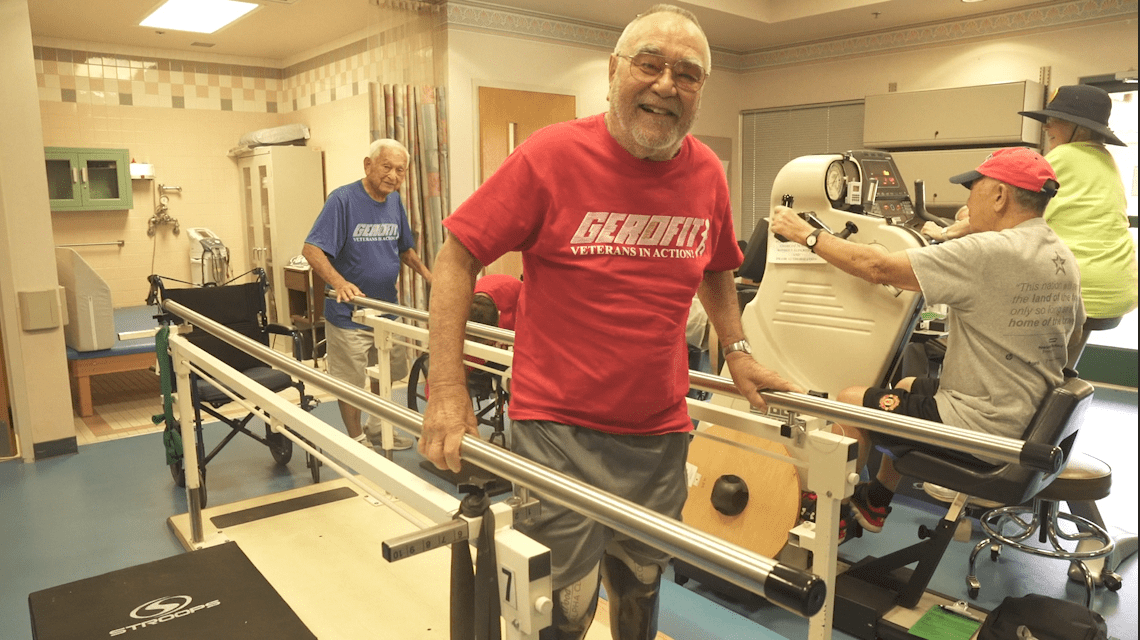Each year, people look at the New Year as a fresh start to achieve their goals. Many include fitness on their New Year resolution list, and there are a variety of programs available through the VA that can help keep you on track. It’s easy to stay active when the warm weather and sunny skies call to you every day. That’s why at the VA Pacific Islands Healthcare System in Hawaii older Veterans are using the Gerofit program to keep them moving.
Gerofit is a supervised exercise program for older Veterans that was developed at the VA Medical Center in Durham, North Carolina, in 1986. Three years ago, to increase program access to Veterans living in rural settings with support from the VA Office of Rural Health, the program was expanded to seven VA medical centers nationwide, including Hawaii. The program promotes lifelong fitness and is prescribed by health care providers to Veterans who are 65 years and older with chronic illnesses. Exercises are tailored for each Veteran based on their physical profile and goals, and the exercises are supervised by trained professionals, such as nurses or physical therapists. Gerofit can include individual and group based exercises such as tai chi, line dancing, balance, core coordination, and strengthening classes. The exercise program may include treadmills, elliptical machines, stair climbers, bicycles and a variety of strengthening machines.
Being active helps older Veterans overcome and manage conditions such as heart disease, severe arthritis, stroke, chronic pain and psychological stress.
“A Veteran was actually so unhealthy they wouldn’t consider him for a transplant. Now he’s back on the list again which is fantastic because he’s working out with us three days a week,” said Michelle McDonald, occupational therapist and coordinator of the Gerofit program in Hawaii.
Henry Lee is 85 years old, a former Army infantry command sergeant major. His doctor recommended him to the program, and during his six months at Gerofit he has lost 20 pounds. “As far as I’m concerned, it kind of helped my knees. You know, I lost both knees during combat and I also had back problems. So the weight has really been beneficial, losing 20 pounds, it’s been one of the things I’ve really wanted to do anyway. I saw my doctor about three weeks ago and and I thanked her for it,” said Lee.
But the benefits are not only physical. To many of the Veterans, the psychological benefits are more important. This includes increased well-being, having a purpose for getting out of bed each day, self-management of diseases, resumption of hobbies, and a shared camaraderie.
“I like to work out with the Veterans. But it’s not only the Veterans, but disabled Veterans,” said Jimmy Lee, an Army Veteran who participates in the program and helps lead the group in chee kung and tai chi exercises. “And this is where I find value because they are older than I am. And when I look at them, being one of the younger ones, watching the older ones is really an incentive for me because seeing them go, we can’t give up. And that’s why it’s very enjoyable,” he said.
The participants have developed a sense of community, one that they had while they were in the service. They know each person by name. Some belong to the same Veteran service organizations and sometimes get together outside of the hospital for social events. They have also formed relationships with the staff that have helped them realize their physical and psychological goals.
“The Veterans here, I love. They’re the reason why I do this. They have this special bond between them that you can’t find anywhere else. The stories they share, they make each other accountable. So if one is missing, for even two days, they’re asking for them,” said McDonald.
“I always said Michelle is not a teacher, she’s a coach. She’s a coach because she’s alongside of us encouraging us, at the same time evaluating us and trying to make sure that we can do things within our capabilities. But she walks and talks with us. She’s side by side, not in front. But on the side of us. And that’s great,” said Jimmy Lee.
Topics in this story
More Stories
The Medical Foster Home program offers Veterans an alternative to nursing homes.
Watch the Under Secretary for Health and a panel of experts discuss VA Health Connect tele-emergency care.
The 2024 National Veteran Suicide Prevention Annual Report provides the foundation for VA’s suicide prevention programs and initiatives.






